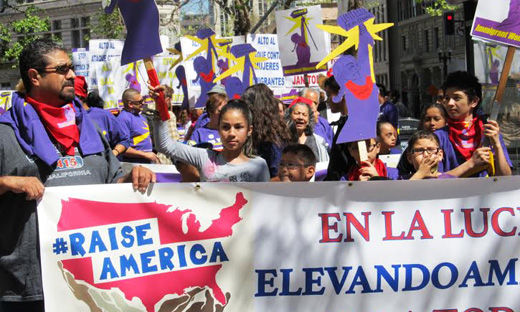
OAKLAND, Calif. – The celebrations began early, even as California’s new minimum wage law was still racing through the state legislature last week, with Governor Jerry Brown poised to sign it quickly.
As workers gathered across the state March 31 to celebrate what would have been the 89th birthday of the great labor and civil rights leader Cesar Chavez, labor unions and other organizations praised the plan to gradually raise the minimum wage to $15 in 2022 as an important first step toward fairer compensation for millions of workers who clean buildings, care for the sick and the old, staff restaurants, and perform many other vital tasks.
As they gathered in the heart of downtown Oakland, hundreds of members of SEIU United Healthcare Workers – West (SEIU-UHW), SEIU United Service Workers – West (SEIU-USWW) and other union and community supporters shared their feelings about the new development.
“I’m proud that on this day, we’re on the verge of winning a $15/hour minimum wage that our union and the fast food workers fought really hard to win,” Maria Trujillo told the crowd. Speaking in Spanish, the union leader and janitor at a health facility in nearby Dublin, called the new law “an important opportunity for nonunion workers to have access to better wages, and an opportunity for us janitors to fight for more. We need to continue the fight, so we can win dignified wages for families.”
Petra, a fast food worker, spoke for her fellow food workers who started the ball rolling back in 2012. She thanked “all those brothers and sisters who have been standing with the fast food workers demanding that we have a livable wage,” and urged the crowd to demand affordable housing in the face of rising rents and the growing threat of homelessness.
Alameda Labor Council executive secretary-treasurer Josie Camacho told the crowd, “There’s no reason people should have to work two and three jobs, struggling to put food on the table and pay the rent.”
Camacho also highlighted a key demand of rally participants when she called for an end to rampant sexual abuse and harassment of women workers – especially janitors – after daytime workers have left.
In San Jose, the celebrations began at the park named for Chavez, and wound through downtown. The issues raised were similar, with the serious problem of sexual assault sharing the stage with excitement over the impending minimum wage hike.
In the Central Valley city of Fresno, the Fresno Bee quoted the Rev. Art Gramaje, pastor of a Catholic church in the southeast area of the city: “If someone works full time, they should be able to provide basic needs – pay rent, buy food and clothing – for their families. That can’t be done now.”
In Fresno County, 22 percent of families are below the poverty line. Some 193,000 workers in the county will gain with the higher minimum.
In Los Angeles on April 4 to sign the bill into law amid a crowd of labor and community supporters, Gov. Brown called the measure “not the end of the struggle, but a very important step forward,” and pledged to “keep it going. We’re not stopping here.”
Brown cited “the way the average American is being treated by this particular economy” as one of the sources for the anger that is marking the presidential primaries. “Today we do something about that,” he said.
Speaking on radio station KPFA March 31, Ken Jacobs, chair of the University of California at Berkeley’s Labor Center, noted that 96 percent of the estimated 5.6 million workers who will benefit from the higher minimum are 20 years old or more, with 75 percent 30 years old or more. Thirty-seven percent are parents, and on average they provide half their family’s income.
He said 74 percent are workers of color, and 55 percent are Latino. More than half are women.
With good manufacturing jobs that used to be available to workers with a high school education or less disappearing, Jacobs said it is urgent for today’s low wage workers to organize and turn today’s bad jobs into good jobs, as workers did with factory jobs generations ago.
Jacobs said research by the Labor Center found that increased minimums in Los Angeles and New York City brought lower worker turnover and higher productivity, greater workers’ buying power while prices rose less than 1 percent.
“You don’t find sizeable effects on the economy or employment,” he said. “What you do find is that higher minimum wages do what they’re intended to do, which is to raise income for low wage families.”
Under the new law the minimum will rise to $10.50 in January 2017 for businesses with 26 or more workers. Smaller businesses will have an extra year to comply with all increases. The wage will reach $11 in 2018 and gain $1 per year after that. After reaching $15 the wage will rise with inflation. During the phase-in, governors could suspend the increases for a year if the budget is in the red or employment and sales taxes go down. No further suspensions are possible after $15 is reached.
A number of California cities have already raised their minimum wages above the current state minimum of $10.
In his remarks at the signing ceremony, Brown noted “the real thrust” of grassroots force behind the bill. Brown and other politicians were pressured into taking action by SEIU-UHW and by SEIU’s California State Council introduction of two ballot initiatives containing even stronger provisions. One qualified for the November ballot at mid-March. Both unions pledged to withdraw their initiatives once the new wage-raising law was passed and signed into law.
Photo: Marilyn Bechtel/PW











Comments